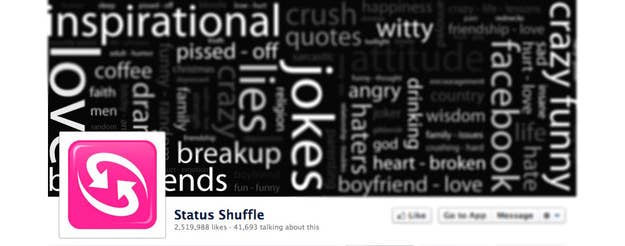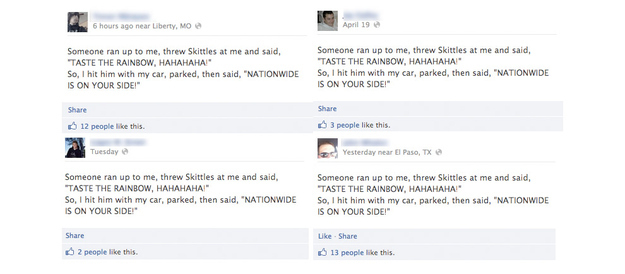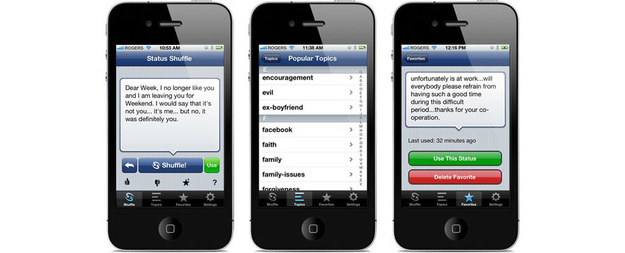
Last Sunday, Jennifer C. updated her Facebook status. Her friends found it funny; two commented, and three clicked the like button. “Fact of life...After Monday & Tuesday, even the calendar says W T F !!” was the status Jennifer had written. Except she hadn’t written it. And neither had the other 120,000-plus people who have also used it as their Facebook status.
That status comes from Status Shuffle, a Facebook application (and accompanying iPhone app) that allows users to choose from a variety of pre-written statuses and post them to their Facebook profile as if they were their own. According to its creators, it has four million active users a month and is one of the longest-running applications on the site. It’s a minor Facebook phenomenon.
The “fact of life” Facebook status is their most popular, they say, and has been used in exactly the same way, questionable punctuation and all, over 120,000 times. That may very well make it the most commonly occurring sentence on all of Facebook.
But most users will never see this “fact of life status” until it appears on their friend’s profile. (There are 900 MILLION Facebook users, after all.) It will appear without attribution and look more or less like any other status, so they likely will assume it was their friend who wrote it.

This is plagiarism. It’s difficult to call it anything else. These are not movie quotes or retellings of inside jokes among friends; these are obvious attempts to present sentiments written by others as one’s own, like any other Facebook status. And Facebook is apparently littered with millions of these statuses.
On both Facebook and the App Store, where it is, at time of writing, the number two most downloaded paid social-networking app, Status Shuffle is incredibly popular and sparklingly reviewed. Users have to feel as if they’re getting away with something. That is, unless their friends have heard of Status Shuffle and noticed its app icon below their status.
“I posted something on Facebook without knowing it would say u used status shuffler,” App Store user Nicky843 wrote in a rare two-star review earlier this month, “so my friends think I’m a loser who can’t come up with my own status.”
Status Shuffle’s 300,000 statuses are all written and submitted by the app’s users. It may be strange that people take them and present them as their own ideas with just a couple of clicks, but the original authors know going in that they’re not going to get credit for their writing. All users have to do is deceive their friends a bit.

“How did you come to hear of Status Shuffle?” the app’s creator, Oz Solomon, asked when I called him. “Because statistically speaking, you’re the wrong gender.”
Solomon wasn’t questioning my carefully crafted cisgendered male identity. He was referring to some graphs he sent me that showed 85 percent of Status Shuffle users are female, and said the user base has been skewing more female, not less, as time goes on. It’s perhaps the most perplexing aspect of the app’s success.
Solomon certainly doesn’t have any answers. “It’s always baffled me,” he said, though he mentioned his wife, Neta, a very active Facebook user, came up with the idea for the app. “A woman thought of it, and women flock to it, so I guess it makes sense at some level.” I doubt it’s a coincidence they’ve made their app logo pink.

Maybe there’s no explaining the winding path of virality. Solomon says he kept Status Shuffle going for nearly a year before it suddenly caught on, in the United Kingdom, of all places. (His company, Social Graph Studios, is based in Toronto.) It took a full year before it went viral in the United States, near the end of 2009, according to Solomon. The iPhone app, on the other hand, was popular as soon as they released it, he said, even though they were still working out the bugs and hadn’t begun marketing it to users.
Perhaps the explanation for Status Shuffle’s distinctive popularity is in one way Solomon describes the app — the “Hallmark of statuses.”

I’ve never seen any reason to buy a greeting card, nor would I ever usually consider using something like Status Shuffle. But like this app, greeting cards are still wildly popular without me, to the tune of 7 billion purchases a year, according to the industry’s trade association. Also according to the trade association: About 80 percent of all greeting cards are bought by women.
Looking closer at App Store reviews, it’s clear people who use the app for their status are using it like one would use a greeting card, to express a mood better than they can in their own words. “Everything I’m feeling they have something for it,” Sammie_69 wrote this week. “In love using status shuffle because I’m not good with words myself,” wrote Missy09/02/09. As Solomon put it, users come into the app after a certain “life event,” looking for “a piece of text that embodies how they’re feeling.” According to Solomon, this status has been used over 116,000 times: “I am strong because I know my weaknesses. I'm alive because I'm a fighter. I am wise because I've been foolish. I laugh because I've known sadness.”
“Plagiarism implies you’re doing something wrong,” Solomon said when I pressed him about it. “If I’m giving you a status with the purpose of you reusing it, then I can’t say that’s plagiarism. It’s more, like, open source. Or Creative Commons.”

Still, you’re not going to find anything profound or terribly witty on Status Shuffle. These statuses are written, after all, by people who came to the app because they don’t feel they’re very good at writing statuses. There are categories like “Christian inspirational,” “divorce sarcasm,” “Edward Cullen is gay,” “fake bitches,” “I love you baby x,” “Justin Bieber gay,” “pissed at boys,” “sarcasm bitchy,” “sisters 4 ever,” “squirrels,” “truck drivers,” “two-faced bitches,” and “WWE quotes.”
According to Status Shuffle’s FAQ, it won’t remove statuses that poke fun at the handicapped, but users can report statuses that are racist. Still, I found categories for racist jokes. “what do you call a bunch of high Mexicans ‘BAKED BEANS,’” reads one. Another: “Just held the door for an Asian guy. he said ‘Sank you,’ so I punched him in the face. I can’t believe he brought up Pearl Harbor like that.”

The social activity on Facebook is itself a game, and it has gotten many of its players addicted to status updates, no matter how mundane they may seem. They’re apparently so hooked they will gladly pay to access a database of status updates written by people they don’t even know, for entertainment. Others have caught on; Status Shuffle has plenty of Web imitators. There are even fan pages for that “fact of life” status.
“When we look at metrics like how long people spend on the app, we get something like around 10 minutes a session," Solomon said. "That’s the kind of number you will see like something like a game.”
To make this small section of the Web enthralled, all you need to do scroll through a random stream of statuses across the screen. Besides, more than anything, reviewers say the app “helps” them. They’re not coldly calculating Machiavellian Facebook social climbers, wickedly searching for any edge to seem more witty or interesting and accrue more social power. They’re just trying to express how they already feel about God, Justin Bieber, or their boyfriend, but don’t know how to say it.
